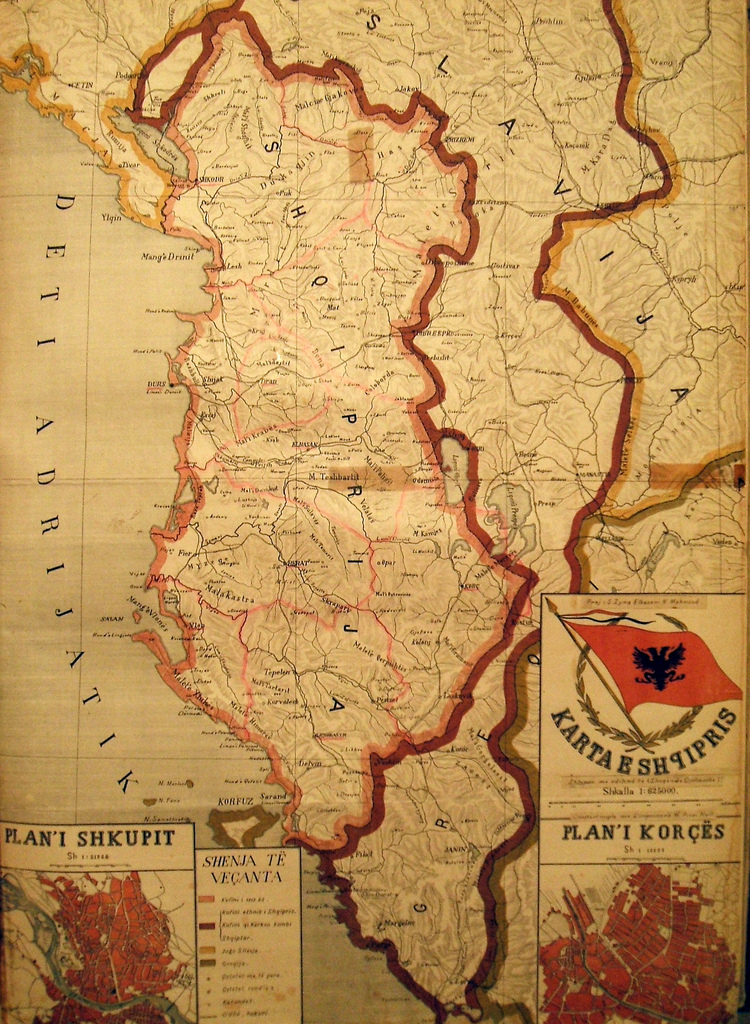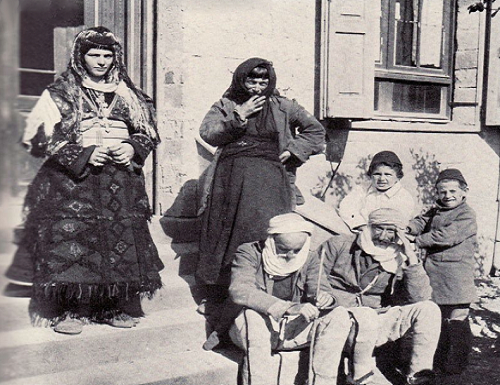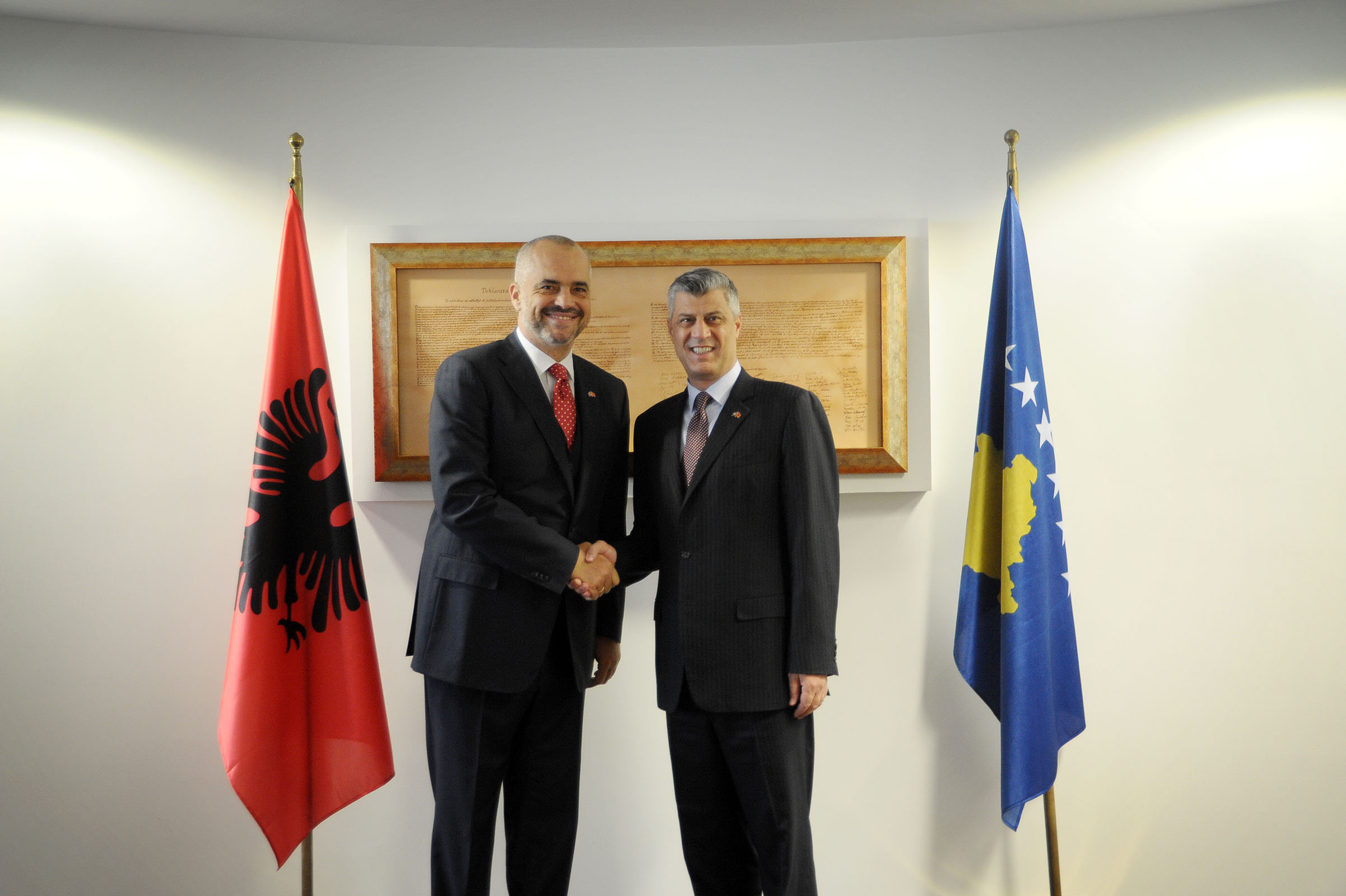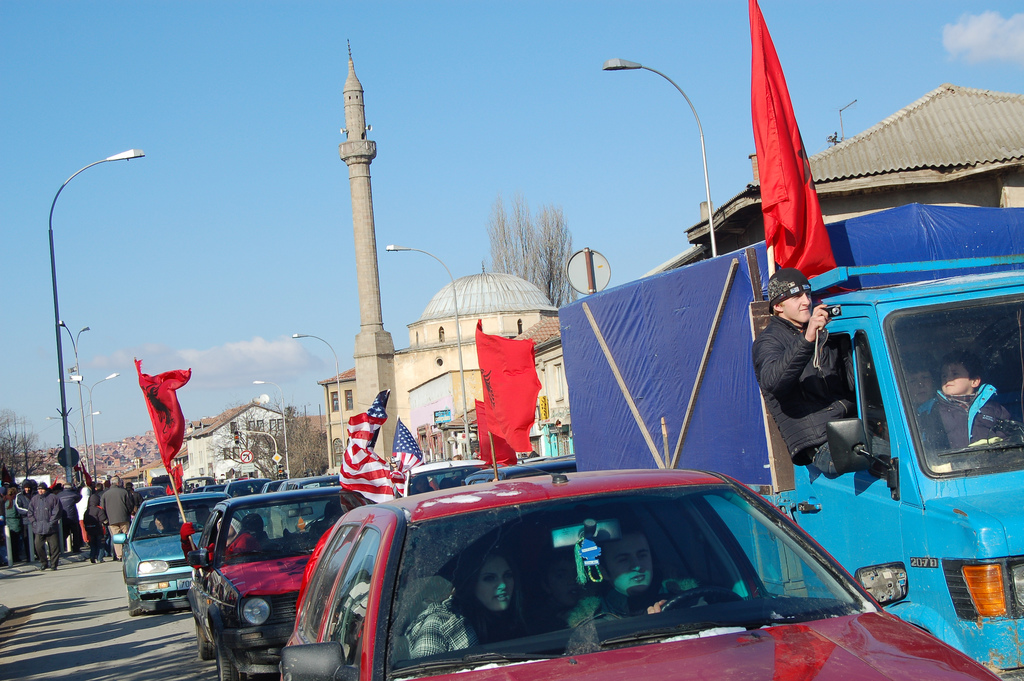
Views: 1168
When at the 1878 Berlin Congress Serbia and Montenegro had to become recognized as sovereign states, the Muslim Albanian representatives tried to initiate the same for their own national state or wider autonomy within the Ottoman Empire which they considered as their own national state.
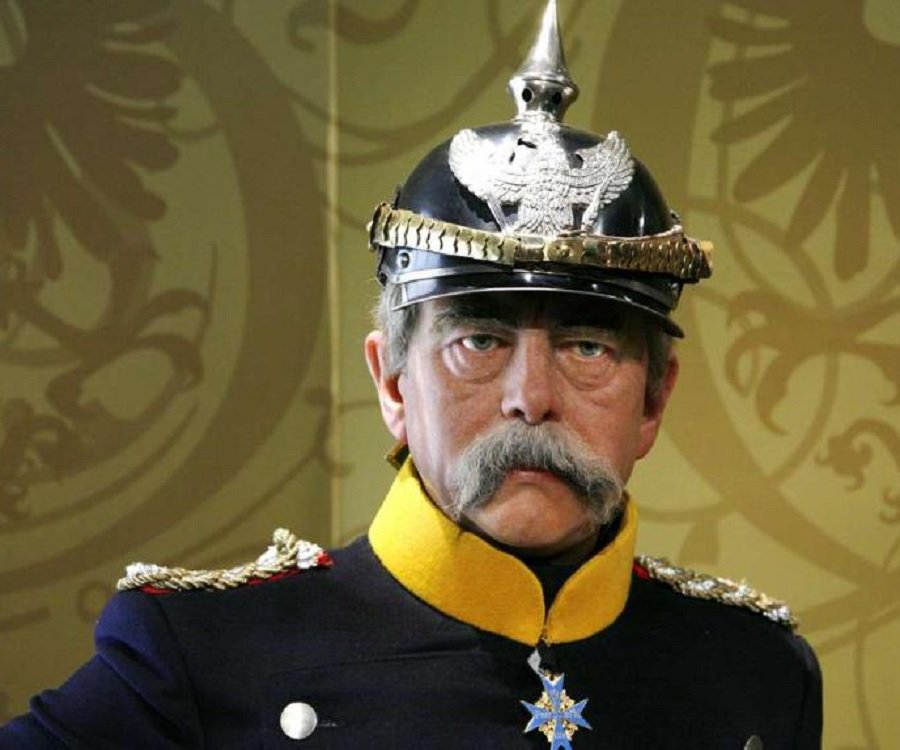
They founded the (First) Prizren League in Metochia (the western portion of contemporary Kosovo).[1] However, this Islamic initiative failed with Bismarck’s explicit rejection to speak about Albanian nationality as nonexistent at all in Europe at that time as they have been considered as the Turks. At the same time, the Albanian national movement Rilindja was initiated, as ideological support for the national striving. It was not insignificant that Rilindja meant renaissance (revival), suggesting that it was concerned not with forging new nationality but just reviving some older one. Nevertheless, at this instance, the Albanian struggle for forging their own nation and consequently their own national state was trigged. With this justifiable aim came along, however, unjustifiable means, as a consequence of insatiable thirst for acquiring the necessary prerequisites for a sovereign state came as well: land, people, and language (as the landmark of an alleged authentic history). Their leaders, in fact, considered that this legitimate end justified any available means, as Machiavelli put it.[2]
Albania was officially proclaimed as an independent state on November 28, 1912, during the First Balkan War (1912−1913), fought between Serbia, Greece, Montenegro, and Bulgaria against the Ottoman Empire.[3] Majority of ethnic Turks in those four countries left them for Asia Minor, some of them voluntarily, some expelled. A small minority of those Turks is still extant in Kosovo-Metochia (KosMet).[4] As a matter of very historical fact, Albania as a state was founded on the insistence of Austro-Hungary, as a barrier between growing Serbia and the Adriatic Sea. As expected, the state borders could not delimit exactly the ethnographic distribution, so that some Serbs, Greeks, “Macedonians”, and Montenegrins remained in Albania and some ethnic Albanians were left in these countries too. When looking at the present-day ethnic distribution one may have the impression that these “ethnic remnants” were unequally distributed and that too many Albanians were left outside the homeland. But this impression is not only deceiving but points into the opposite direction.
Two decisive phenomena have contributed to this situation: migrations and demographic expansion.
Migrations
The issue of migrations can be split into two categories: anthropological and political. The first refers to the common tendency of the highlanders to move to the lowlands like the Balkan Dinariods. North Albanian mountaineers used to migrate to the Albanian plane in Central Albania, but equally firstly to Metochia and then Kosovo (proper), during the Ottoman rule especially after the 1690 First Great Serbian Migration from Kosovo-Metochia to South and Central Hungary.[5] Apart from the slow individual migrations, ever present in such situations, there is what a Serb ethnologist and ethnographer Jovan Cvijić labeled as metanastatic migration.[6] In other words, ever after an abortive uprising or rebellion within the Ottoman Empire (or elsewhere) people from the region used to find their escape from the certain retaliation by moving to more secure areas.
It happened many times, for instance with the Serbs from Bosnia-Herzegovina, who used to move to Serbia (independent or occupied alike), with Serbs and Albanians from KosMet moving to North Serbia or the Habsburg Monarchy (Austria-Hungary from 1867 to 1918) from the territory of the Ottoman Empire, the Serbs from the so-called Independent State of Croatia (during WWII), the Serbs from Croatia and Bosnia-Herzegovina during the civil wars in ex-Yugoslavia in the 1990s, the Albanians and non-Albanians from KosMet during the NATO aggression on the Federal Republic of Yugoslavia (the FRY) in March-June 1999 (78 days). In the case of rebellions on the smaller scale, the very government moves forcibly some population, as many villages in present-day Turkey, populated by the Bosnians-Herzegovinians (Bosniaks), testify.
Political migrations are motivated by governments’ desires to expand its population into the neighboring areas so as to broaden its control and subsequently its state. Some of these controlled migrations appear counter-measures against the first ones, in order to balance the demographic disequilibrium.
Demographic expansion
With regard KosMet, this ethnographic phenomenon concerns the misbalance in the birthrate of two populations in close contact, sharing the same territory – the Serbs and the Albanians. The ethnic Albanians have by far the biggest birthrate in Europe, matching those of Central Africa. This phenomenon has resulted in the demographic explosion, in particular in non-Albania’s regions, where a considerable number of ethnic Albanians live. It concerns Serbia, North Macedonia, Montenegro, and Greece.
Both effects mentioned above have resulted in the misbalance in the demographic content within the areas bordering Albania, mentioned above. When the borders of Albania in 1913 were drawn, the ethnic Albanians were a small part of the contemporary populations in West North Macedonia, Kosovo-Metochia in Serbia, East Montenegro, and North-West Greece (Epir, which Albania’s Albanians call Cameria, with a clear message to Greece).[7]
In the view of all of these claims by the Albanian leaders on the territories where the ethnic Albanians are majority today, it reminds one of an appeal of a lawyer, who defends a man accused of killing his parents, addressing the members of the jury with the words: “Gentlemen jury, will you really have a hart to sentence this orphan?”
To these two points, one should add another, important for the understanding of the Albanian Question in general. It is tightly linked with the issue of ethnic Albanians outside Albania and the project of a Greater Albania. One of the arguments for interpreting the present demographic distribution has always been the ethnic purity of proper Albania. In other words, it has been always claimed by the Albanians and supported by the official statistical data, that this “purity” testifies the unjust drawing of the borders between Albania and the neighboring countries. The argument, in fact, goes like this. Albania is founded on the ground where only the ethnic Albanians live, whereas the bordering areas with mixed populations were delivered to the neighboring states around Albania – the motherland of the ethnic Albanians. The statistic which should corroborate these claims is the following: In present-day Albania live 95% ethnic Albanians, 3% Greeks and the rest goes to the Slavs and other minorities.[8] These data, however, are false.[9] According to the Greek records, there are about 400.000. Greeks in Albania, which constitutes 12% of the overall population. As for the other minorities, the situation is similar – their real number is officially suppressed. It is known that the Slavophone Albanians are not allowed to speak Slavic language in Albania (the Serb or the “Macedonian”), as the Yugoslav journalists found many times while visiting Albania. The above estimate is further corroborated by the statistic of confessional distribution in Albania: 70% Muslim, 20% Greek Orthodox and 10% Roman Catholics. However, those 20% of Christian Orthodox confession are not allowed to declare themselves as non-Albanians but, nevertheless, they belong to the Greeks, Serbs, Montenegrins, and “Macedonians”. The Roman Catholics are the ethnic Albanians from North Albania.
However, this is not the end of the story. Practically all traces of the presence of non-Albanian elements have been wiped out in Albania, like toponyms, ethnological staff, etc. This instance will be of the utmost importance when considering the state of art at KosMet and the foreseeable future of the province.
In conclusion, it can be summarized the political strategy for the creation of a Greater Albania by the following:
(a) The false hypothesis of ancient Illyrian (Pelasgian) origin should provide the ethnic Albanians with the right on any land they are occupying presently (or even in the near future), endowing them with the unique status as indigenous people on the Balkans.[10]
(b) The majorization of the mixed populated areas by migration and fast breeding should provide the young state of Albania with its Lebensraum.
(c) All non-Albanians within the projected state must be eliminated, either by expelling or by assimilation as it is already done in the case of Kosovo-Metochia, for instance.[11]
www.global-politics.eu/sotirovic
sotirovic@global-politics.eu
© Vladislav B. Sotirović 2019
[1] Петер Бартл, Албанци од Средњег века до данас, Београд: CLIO, 2001, 94−97.
[2] It has to be noted that the meaning of his famous slogan “The aim determines the means” has often been distorted into “The aim justifies the means”.
[3] On the 1912−1913 Balkan Wars, see in [E. R. Hooton, Prelude to the First World War: The Balkan Wars 1912−1913, Fonthill, 2014].
[4] KosMet is an abbreviated term for historical Serbia’s province of Kosovo-Metochia. The term was in use until December 1968 when the Yugoslav Communist authorities replaced it by only the term Kosovo (Kosova in Albanian) for the sake to politically more link the province with the Albanian population and, therefore, to more alienate it from Serbia, the Serbs, and Serbian history and culture. The problem with the term Metochia was in essence of the political nature as it is in direct association with the Serbian national, historical, and cultural background. Metochia as a geographical region of the western part of the province of Kosovo-Metochia is originally meaning the “church land”, i.e. the huge portions of West KosMet which historically belong to the Serbian Orthodox Church. The term Metochia is derived from the Greek word metoch – the land belonging to the church or the monastery usually granted by the feudal lords (magnates) or the rulers. Politically, the term Metochia shows no Albanian historical connections with the province but only the Serbian ones. Geographically, Metochia is the populated and fertile plain running from the city of Peć down to the city of Prizren (for the Serbs – the “Serbian Constantinople” as Prizren was in the Middle Ages a capital of Serbia). The term KosMet is applied for the whole province, with the term Kosovo referring only to its western part. The Albanian-language equivalent of Metochia is Dukagjin – a term derived from the Latin dux (Duke).
[4] On the Balkan Wars, see in [Б. Ратковић, М. Ђуришић, С. Скоко, Србија и Црна Гора у Балканским ратовима 1912−1913, Друго издање, Београд: БИГЗ, 1972].
[5] About this migration, see in [Radovan Samardžić i drugi, Kosovo i Metohija u srpskoj istoriji, Beograd: SKZ, 1989, 127−142; Стефан Чакић, Велика сеоба Срба 1689/90 и патријарх Арсеније III Црнојевић, Нови Сад: Добра вест, 1990].
[6] The first word comes from the Greek μέτα (after) and ανάστασις (uprising).
[7] It is also called as South Albania (Shqiperia jugore).
[8] Data are from 1989.
[9] Some of the latest statistics provide: Greeks 1%. A British researcher Hugh Poulton decisively claims that “All these [official] figures are contested” [Hugh Poulton, The Balkans. Minorities and States in Conflict, London: Minority Rights Group, 1994, 195].
[10] A British historian Noel Malcolm is one of the best examples of spreading such false hypothesis in the academic circles [Noel Malcolm, Kosovo: A Short History, New York: New York University Press, 1998]. But who is he? Noel Malcolm (born in 1956) is a British scholar and historian. After the success in the West of his pro-Muslim and pro-Croat book Bosnia: A Short History (London, 1995), he published next piece of shameful propaganda work ‒ pro-Albanian and enormously anti-Serbian Kosovo: A Short History (New York, 1998). This not academic, not objective and highly politically motivated book, however, was very much praised in the West and had a great impact among the Western readers during the 1998‒1999 Kosovo War. He became active pro-Albanian propagator as the president of the Anglo-Albanian Association in London.
[11] Мирко Чупић, Отета земља. Косово и Метохија (злочини, прогони, отпори…), Београд. Нолит, 2006; Hannes Hofbauer, Eksperiment Kosovo: Povratak kolonijalizma, Beograd: Albatros Plus, 2009; Пјер Пеан, Косово: „Праведни“ рат за стварање мафијашке државе, Београд: Службени гласник, 2013.
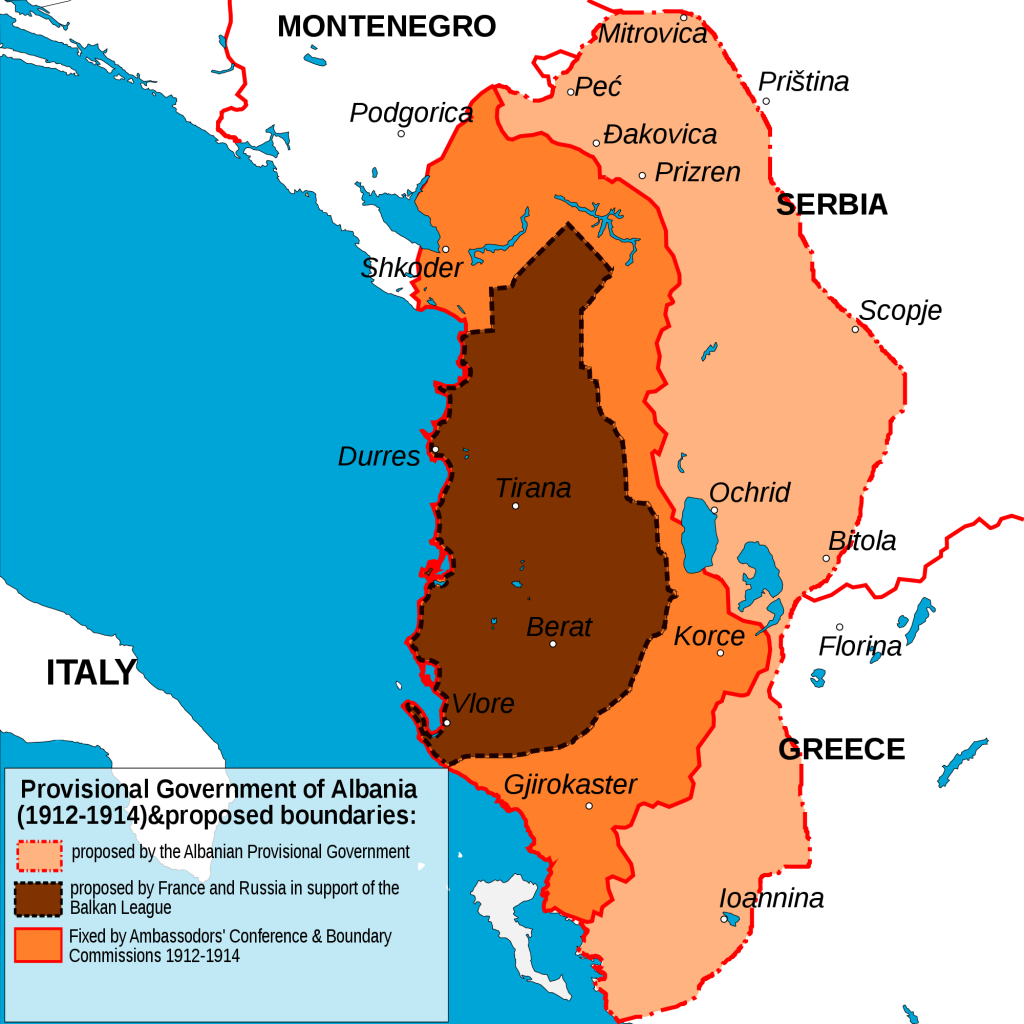
Origins of images: Facebook, Twitter, Wikimedia, Wikipedia, Flickr, Google, Imageinjection & Pinterest.
Read our Disclaimer/Legal Statement!
Donate to Support Us
We would like to ask you to consider a small donation to help our team keep working. We accept no advertising and rely only on you, our readers, to keep us digging the truth on history, global politics and international relations.
FOLLOW US ON OUR SOCIAL PLATFORMS

